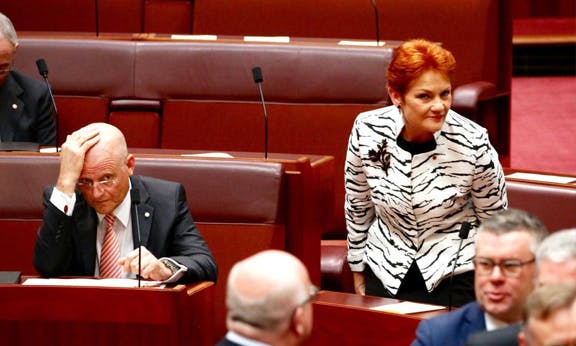Australian conservatism’s intellectual impasse

The politically shrewd US novelist Norman Mailer once suggested that “the natural disease” of conservatism, “since it does hold so many fixed positions”, is oedema (a swelling caused by too much fluid retention in body tissue). Against this ever present mortal danger, Mailer continued, “the mark of a good conservative is that they’re bold”. He nominated Winston Churchill and Charles de Gaulle as examples of “good conservatives”. Whatever you might make of his choice of metaphor, Mailer’s assessment of right wing politics is quite astute.
Conservatism’s fundamental mission, after all, is to preserve the status quo and hold the line against perilous progressive change. It claims that any and all modifications to society (whether ill or well intended) inevitably lead to terrible harm and potentially even disaster. Which means that the only appropriate course of action is to maintain the current state of affairs (whatever they may be), and do everything feasible to protect the traditional, archaic institutions of the system.
Capitalist society is permanently in a state of flux. To comprehend it properly at any moment – and be a relevant political actor within it – requires a certain amount of intellectual nimbleness, suppleness and freshness.
The conservative style of political thought is always susceptible to laziness and rigidity, in which the philosophical outlook is always pessimistic and the political arguments employed are always framed in the negative. Unless this illness can be diagnosed in time and properly treated – with what Mailer calls “boldness”, i.e. an injection of intellectual vitality and energy, fresh critical insights and novel policy ideas – conservatism is at risk of dying from entropic decay.
This brings us to the subject at hand: the escalating identity crisis and uncertain future of modern Australian conservatism. Over the past decade or so, this movement has been undergoing an entangled, confrontational and taxing political scrimmage, containing no shortage of bitter feuds, wild misadventures, self-destructive behaviour and opaque philosophical contemplation.
Its present troubles and uncertainties are in remarkable contrast to its immense triumphs from the recent past. The previous generation of the movement – which peaked roughly from the mid-1980s to the mid-2000s – was able to reign mightily as a dominant political current across the country. As a bulwark defending “traditional” Australian values, as a backlash against the momentous changes that had taken place in the country since the end of the Second World War and as an obstruction to many campaigns for progressive change, it was undoubtedly incredibly successful.
But that era of Australian history came to an end around 2007 to 2008, politically with the end of the Howard government and economically with the start of the global financial crisis. From this point onwards, Australia has been undergoing a significant transformation, in its economy, state, civil society and national culture, both inside its borders and in relation to the rest of the world.
Conservatism hasn’t been left ignorant of these changes. Especially over the past three or four years, there has emerged an awareness among many right wing politicians and journalists – sometimes on an explicit and conscious level, other times as a gut feeling – that as Australia evolves, modernises itself and shifts direction globally, conservatism must renew itself, reform itself and adapt to the new historical circumstances. Things can’t keep going the way they have been: there needs be a significant (excuse the cliché) paradigm shift in Australian conservatism in order for it to remain a relevant political force.
This has resulted in the sudden sprouting of alternative right wing parties, each one trying to occupy that same political geography to the right of the Liberals: the return of Pauline Hanson’s One Nation, the resurgence of Fred Nile’s Christian Democrats, Cory Bernardi’s breakaway Australian Conservatives, Derryn Hinch’s Justice Party, the libertarian Liberal Democratic Party, the Democratic Labour Party, Bob Katter’s Australia Party, the Nick Xenophon Team and the Jacqui Lambie Network.
But, thus far, this conservative burgeoning has produced zero significant results at a political-intellectual-policy level. The new right wing politicians who have thrust themselves onto the national scene are a most uninspiring, talentless and simple-minded bunch.
They are very good at creating and holding onto a small, passionate voter base through the use of piercing, strident ultra-conservative rhetoric. But in terms of being the guardians for a new generation of conservatism, they have been completely inadequate for the mission.
Across all the policies from all the aforementioned parties, a significant majority are dry, vanilla right wing: having business-friendly taxes and regulations to promote “free enterprise”; having a “tough” criminal justice system to “punish” criminals and keep society “safe”; reducing immigration and refugee intake to “sustainable” levels; ending Aboriginal “privileges”; promoting Australia’s Western values and the traditional family; and putting an end to the divisiveness of multiculturalism, green ideology and political correctness. It’s almost as though they’ve done a cut-and-paste job from the conservatism of the 1980s and 1990s – without any attempt at renewal or updating, or any rethink of the issues.
But it goes far deeper than that. Their entire way of viewing and understanding the world, the language they use to describe what’s right and wrong with present-day Australia, the arguments they make to assert their opinions – everything they do and say and think is simply taken from the previous generation of conservatism. Rather than bringing forth a new era of right wing politics, they seem to be trying to rehash, remarket and remodel the old.
So while conservatives in Australia might yearn for the emergence of their own Churchill or de Gaulle, they must for now make do with such political lightweights as Cory Bernardi and David Leyonhjelm.